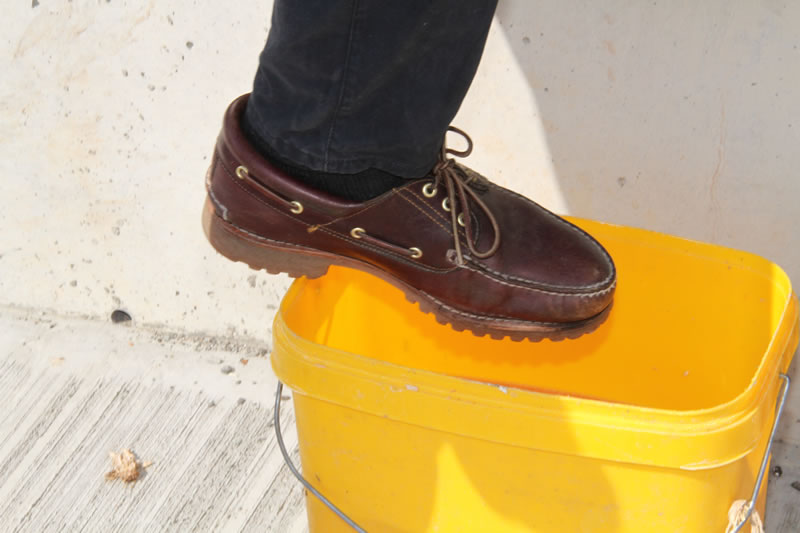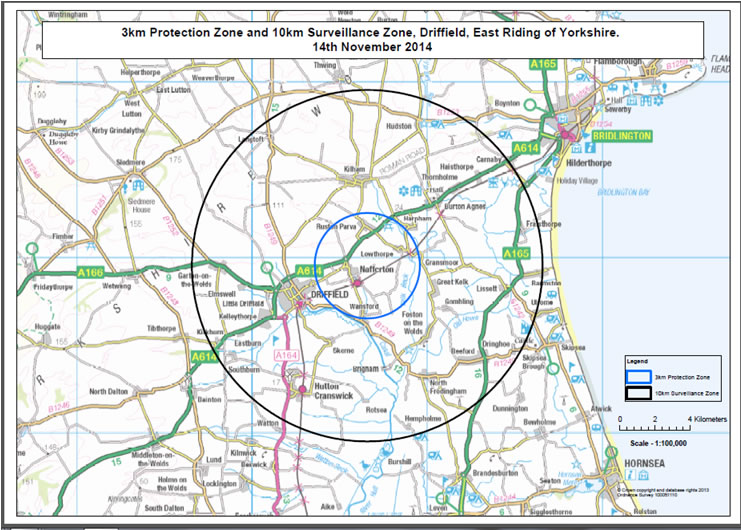
Part of Yorkshire has been sealed off and restrictions put in place following an outbreak of highly pathogenic avian influenza on a duck breeding farm.
The outbreak, which is believed to be in the Driffield area of the East Riding of Yorkshire and which comes shortly after outbreaks of avian influenza in Germany and Holland, has been officially confirmed by the Department for Environment, Food and Rural Affairs (DEFRA), which is working together with Public Health England (PHE) to ensure it is contained.
Robert Gooch, director of policy with the British Free Range Egg Producers’ Association (BFREPA), urged egg producers to ensure they were maintaining the highest standards of bio-security to minimise the risk of cross-contamination. “We are in touch with DEFRA,” he said. “Members should keep up the highest levels of bio-security until we hear more from the department.”
The National Farmers’ Union (NFU) has also issued a statement. The union’s chief poultry adviser, Gary Ford, said, "The NFU is working with Defra and Public Health England and understand that the risk to human health from this incident is very low. Defra has introduced a restriction zone and there will be a cull of birds on the farm. There are tests ongoing into the type of avian influenza this is, with results expected in the next few days. At this stage we know it is not H5N1.”

An initial statement posted by DEFRA on its web site read, "Immediate action has been taken, including introducing a 10km restriction zone and culling all poultry on the farm to prevent any potential spread of infection.” DEFRA says the outbreak is on a 6,000-duck rearing unit.
The Ranger subsequently received a statement, which read, “We have confirmed a case of avian flu on a duck breeding farm in Yorkshire – the public health risk is very low and there is no risk to the food chain. We are taking immediate and robust action, which includes introducing a 10km restriction zone and culling all poultry on the farm to prevent any potential spread of infection. A detailed investigation is ongoing. We have a strong track record of controlling and eliminating previous outbreaks of avian flu in the UK.”
The department said that the outbreak was confirmed on Sunday afternoon and had been identified as a H5 avian flu strain. Tests were being carried out to identify the exact strain of the disease, but it said Public Health England had confirmed that the risk to public health was extremely low. It said the H5N1 strain that was infectious for humans had been ruled out.
DEFRA said that the advice from the Food Standards Agency was that avian flu did not pose a food safety risk for UK consumers.
“Investigations are now ongoing to discover whether the outbreak is linked to cases found in the Netherlands and Germany, with further test results expected over the coming days. The UK has a strong track record of controlling and eliminating previous outbreaks of avian flu and all action will be taken to control this outbreak to prevent a further spread of the disease.”
It said that movements of all poultry, products and waste within the restriction zone were banned. Poultry had to be housed or isolated within the zone. Bird gatherings (fairs, shows, exhibitions) were also banned and game birds could not be released.
Public Health England issued its own statement separately, which read, “Public Health England are assisting Defra in the investigation of an avian flu outbreak at a duck breeding farm in Yorkshire. Based on what we know about this specific strain of avian influenza, the risk to human health in this case is considered extremely low.'
Investigations are also underway into recent outbreaks in Germany and Holland. The German outbreak was confirmed as H5N8 and struck fattening turkeys in North East Germany (Mecklenburg Western Pomerania). Increased mortality was observed in one of six sheds of 15 week old birds. The farm housed just over 30,000 birds in total.
The Dutch outbreak, which also involved H5N8, was in the village of Hekendorp. The authorities ordered the culling of 150,000 hens on a poultry unit there following confirmation of AI. A three-day nationwide ban on the transportation of poultry and eggs was imposed and a 10 kilometre exclusion zone was established around the affected farm.
How to spot avian influenza
There are 2 types of avian influenza.
Highly pathogenic avian influenza (HPAI) is the more serious type. It is often fatal in birds.
The main clinical signs of HPAI in birds are:
Swollen Head
Blue discolouration of neck and throat
Loss of appetite
Respiratory distress such as gaping beak, coughing, sneezing, gurgling, rattling
diarrhoea
Fewer eggs laid
Low pathogenic avian influenza (LPAI) is usually less serious. It can cause mild breathing problems, but affected birds will not always show clear signs of infection.
The severity of LPAI depends on the type of bird and whether it has any other illnesses.
